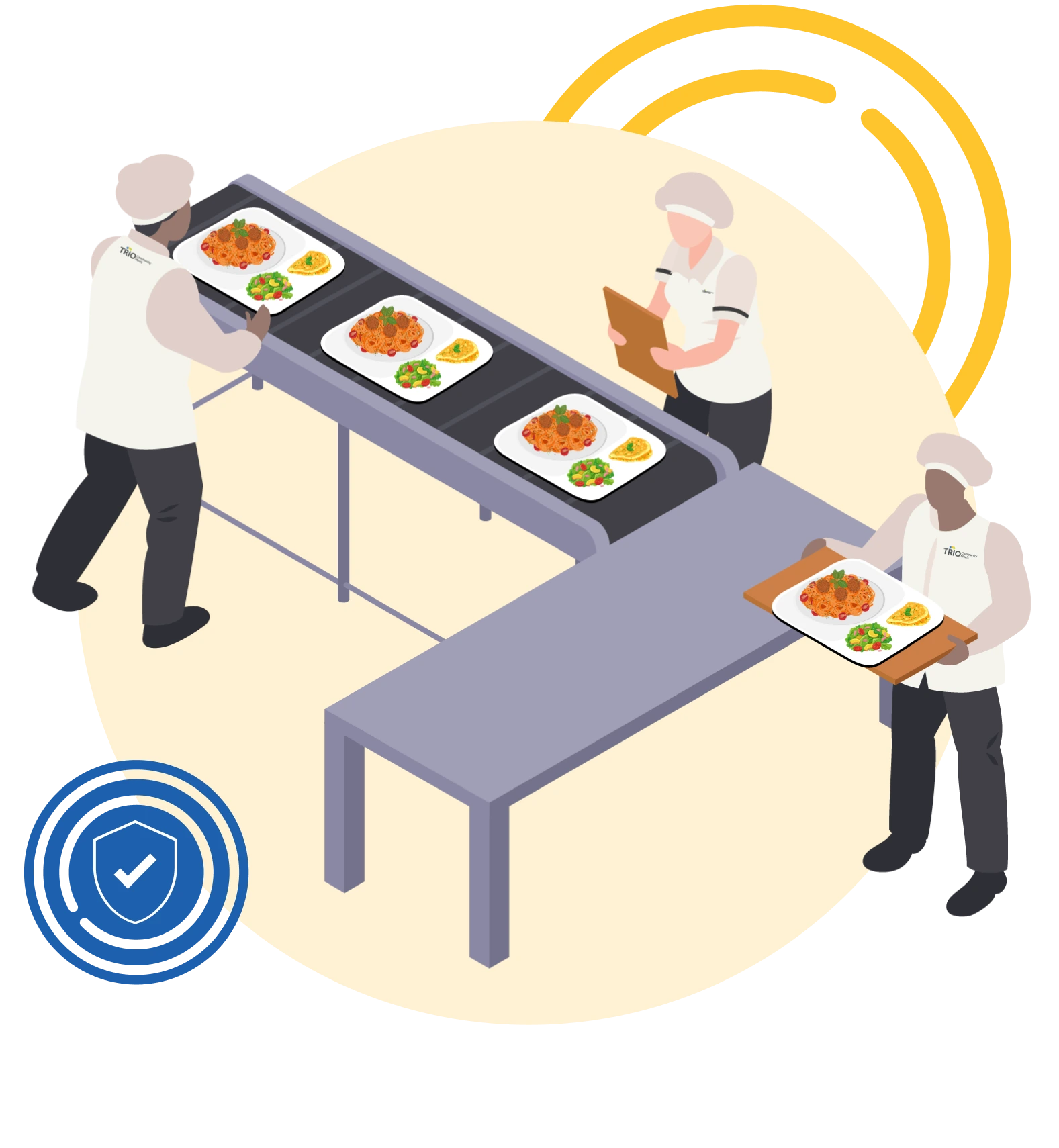
TRIO COmmunity Meals
Food Safety at Every Step
Nourishing older adults and other vulnerable populations brings with it a deep responsibility to ensuring that nourishment is delivered with food safety baked into the process. At TRIO Community Meals, we take that responsibility very seriously.
Through TRIO’s rigid food safety and sanitation practices, our teams follow strict food safety protocols and food handling procedures that ensure all our meals are prepared with integrity and are safe to consume.
TRIO Community Meals Teams Follow Strict Safety Protocols
Food and Workplace Safety
The way we store, prepare, and serve food can significantly impact the health and well-being of our clients and your meal recipients. For that reason, TRIO maintains a Food Safety Manual in the Food Service Director’s office in each kitchen for reference and updates.
- All managers must pass an approved food safety manager certification course (such as ServSafe) and recertification is required at least every five years or according to local requirements. A ServSafe Manager must always be on site during operating hours.
- TRIO utilizes a tracking system to ensure all team members are up to date in their food safety training.
- Kitchen workers are required to properly wear gloves and masks and wash their hands before and after a task. Team members unable to wash hands, such as drivers, will effectively sanitize their hands with hand sanitizer.
- Meals are sealed under rigid food safety protocol and only opened by the meal recipient.
HACCP Implementation
To ensure all food is safely prepared, TRIO uses the Hazard Analysis & Critical Control Point (HACCP) system.
- This is a national standard for food safety throughout the entire foodservice operation—from recipe development through delivery of products, storage, preparation, holding, or reheating of foods.
- HACCP identifies any risks of contamination due to improper food handling.
- All of TRIO’s food service directors are Seafood HACCP certified
Enhanced Cleaning and Sanitation
Our rigorous sanitation practices exceed CDC’s recommended procedures to help prevent the spread of harmful pathogens and allergens.
- Every kitchen follows a master cleaning schedule to ensure routing cleanings are done timely and properly.
- Commonly used production surfaces, delivery equipment and vehicles are cleaned and sanitized before and after each use.
- Going further, TRIO has partnered with Ecolab to conduct EcoSure Food Safety Audits. These audits hold TRIO teams to a higher standard than traditional local health departments, ensuring we go above and beyond to keep seniors safe.
Food and Workplace Safety
TRIO’s food safety policies and procedures are reinforced through continuous education including monthly training programs and online tools. Our team members observe all health requirements to help ensure the health and safety of our teams and consumers.
- All managers must pass an approved food safety manager certification course (such as ServSafe) and recertification is required at least every five years or according to local requirements. A ServSafe Manager must always be on site during operating hours.
- TRIO utilizes a tracking system to ensure all team members are up to date in their food safety training.
- Kitchen workers are required to properly wear gloves and masks and wash their hands before and after a task. Team members unable to wash hands, such as drivers, will effectively sanitize their hands with hand sanitizer.
- Meals are sealed under rigid food safety protocol and only opened by the meal recipient.
HACCP Implementation
To ensure all food is safely prepared, TRIO uses the Hazard Analysis & Critical Control Point (HACCP) system.
- This is a national standard for food safety throughout the entire foodservice operation—from recipe development through delivery of products, storage, preparation, holding, or reheating of foods.
- HACCP identifies any risks of contamination due to improper food handling.
- All of TRIO’s food service directors are Seafood HACCP certified.
Enhanced Cleaning and Sanitation
Our rigorous sanitation practices exceed CDC’s recommended procedures to help prevent the spread of harmful pathogens and allergens.
- Every kitchen follows a master cleaning schedule to ensure routing cleanings are done timely and properly.
- Commonly used production surfaces, delivery equipment and vehicles are cleaned and sanitized before and after each use.
- Going further, TRIO has partnered with Ecolab to conduct EcoSure Food Safety Audits. These audits hold TRIO teams to a higher standard than traditional local health departments, ensuring we go above and beyond to keep seniors safe.